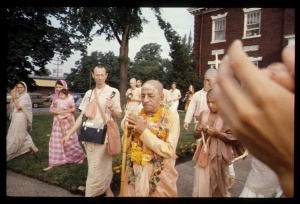SB 4.20.38: Difference between revisions
m (1 revision(s)) |
No edit summary |
||
| Line 1: | Line 1: | ||
{{info | {{info | ||
|speaker=Maitreya | |speaker=Maitreya Ṛṣi | ||
|listener=Vidura | |listener=Vidura | ||
}} | }} | ||
[[Category:Srimad-Bhagavatam - Canto 04 Chapter 20]] | |||
[[Category:Bhagavatam Verses Spoken by Maitreya Rsi - Vanisource|042038]] | |||
<div style="float:left">'''[[Srimad-Bhagavatam]] - [[SB 4|Fourth Canto]] - [[SB 4.20: Lord Visnu's Appearance in the Sacrificial Arena of Maharaja Prthu|Chapter 20: Lord Viṣṇu's Appearance in the Sacrificial Arena of Mahārāja Pṛthu]]'''</div> | |||
<div style="float:right">[[File:Go-previous.png|link=SB 4.20.37]] '''[[SB 4.20.37]] - [[SB 4.21.1]]''' [[File:Go-next.png|link=SB 4.21.1]]</div> | |||
{{RandomImage}} | |||
==== TEXT 38 ==== | ==== TEXT 38 ==== | ||
<div | <div class="verse"> | ||
adṛṣṭāya namaskṛtya | :adṛṣṭāya namaskṛtya | ||
nṛpaḥ sandarśitātmane | :nṛpaḥ sandarśitātmane | ||
avyaktāya ca devānāṁ | :avyaktāya ca devānāṁ | ||
devāya sva-puraṁ yayau | :devāya sva-puraṁ yayau | ||
</div> | </div> | ||
| Line 16: | Line 22: | ||
==== SYNONYMS ==== | ==== SYNONYMS ==== | ||
<div | <div class="synonyms"> | ||
''adṛṣṭāya''—unto one who is beyond the purview of material vision; ''namaḥ-kṛtya''—offering obeisances; ''nṛpaḥ''—the King; ''sandarśita''—revealed; ''ātmane''—unto the Supreme Soul; ''avyaktāya''—who is beyond the manifestation of the material world; ''ca''—also; ''devānām''—of the demigods; ''devāya''—unto the Supreme Lord; ''sva-puram''—to his own house; ''yayau''—returned. | |||
</div> | </div> | ||
| Line 23: | Line 29: | ||
==== TRANSLATION ==== | ==== TRANSLATION ==== | ||
<div | <div class="translation"> | ||
King Pṛthu then offered his respectful obeisances unto the Supreme Personality of Godhead, who is the Supreme Lord of all demigods. Although not an object of material vision, the Lord revealed Himself to the sight of Mahārāja Pṛthu. After offering obeisances to the Lord, the King returned to his home. | King Pṛthu then offered his respectful obeisances unto the Supreme Personality of Godhead, who is the Supreme Lord of all demigods. Although not an object of material vision, the Lord revealed Himself to the sight of Mahārāja Pṛthu. After offering obeisances to the Lord, the King returned to his home. | ||
</div> | </div> | ||
| Line 30: | Line 36: | ||
==== PURPORT ==== | ==== PURPORT ==== | ||
<div | <div class="purport"> | ||
The Supreme Lord is not visible to material eyes, but when the material senses are inclined to the transcendental loving service of the Lord and are thus purified, the Lord reveals Himself to the vision of the devotee. Avyakta means "unmanifested." Although the material world is the creation of the Supreme Personality of Godhead, He is unmanifested to material eyes. Mahārāja Pṛthu, however, developed spiritual eyes by his pure devotional service. Here, therefore, the Lord is described as sandarśitātmā, for He reveals Himself to the vision of the devotee, although He is not visible to ordinary eyes. | The Supreme Lord is not visible to material eyes, but when the material senses are inclined to the transcendental loving service of the Lord and are thus purified, the Lord reveals Himself to the vision of the devotee. ''Avyakta'' means "unmanifested." Although the material world is the creation of the Supreme Personality of Godhead, He is unmanifested to material eyes. Mahārāja Pṛthu, however, developed spiritual eyes by his pure devotional service. Here, therefore, the Lord is described as ''sandarśitātmā,'' for He reveals Himself to the vision of the devotee, although He is not visible to ordinary eyes. | ||
</div> | |||
''Thus end the Bhaktivedanta purports of the Fourth Canto, Twentieth Chapter, of the Śrīmad-Bhāgavatam, entitled "Lord Viṣṇu's Appearance in the Sacrificial Arena of Mahārāja Pṛthu."'' | |||
</div> | |||
__NOTOC__ | |||
<div style="float:right; clear:both;">[[File:Go-previous.png|link=SB 4.20.37]] '''[[SB 4.20.37]] - [[SB 4.21.1]]''' [[File:Go-next.png|link=SB 4.21.1]]</div> | |||
__NOTOC__ | |||
__NOEDITSECTION__ | |||
Revision as of 14:52, 22 May 2021

A.C. Bhaktivedanta Swami Prabhupada
TEXT 38
- adṛṣṭāya namaskṛtya
- nṛpaḥ sandarśitātmane
- avyaktāya ca devānāṁ
- devāya sva-puraṁ yayau
SYNONYMS
adṛṣṭāya—unto one who is beyond the purview of material vision; namaḥ-kṛtya—offering obeisances; nṛpaḥ—the King; sandarśita—revealed; ātmane—unto the Supreme Soul; avyaktāya—who is beyond the manifestation of the material world; ca—also; devānām—of the demigods; devāya—unto the Supreme Lord; sva-puram—to his own house; yayau—returned.
TRANSLATION
King Pṛthu then offered his respectful obeisances unto the Supreme Personality of Godhead, who is the Supreme Lord of all demigods. Although not an object of material vision, the Lord revealed Himself to the sight of Mahārāja Pṛthu. After offering obeisances to the Lord, the King returned to his home.
PURPORT
The Supreme Lord is not visible to material eyes, but when the material senses are inclined to the transcendental loving service of the Lord and are thus purified, the Lord reveals Himself to the vision of the devotee. Avyakta means "unmanifested." Although the material world is the creation of the Supreme Personality of Godhead, He is unmanifested to material eyes. Mahārāja Pṛthu, however, developed spiritual eyes by his pure devotional service. Here, therefore, the Lord is described as sandarśitātmā, for He reveals Himself to the vision of the devotee, although He is not visible to ordinary eyes.
Thus end the Bhaktivedanta purports of the Fourth Canto, Twentieth Chapter, of the Śrīmad-Bhāgavatam, entitled "Lord Viṣṇu's Appearance in the Sacrificial Arena of Mahārāja Pṛthu."